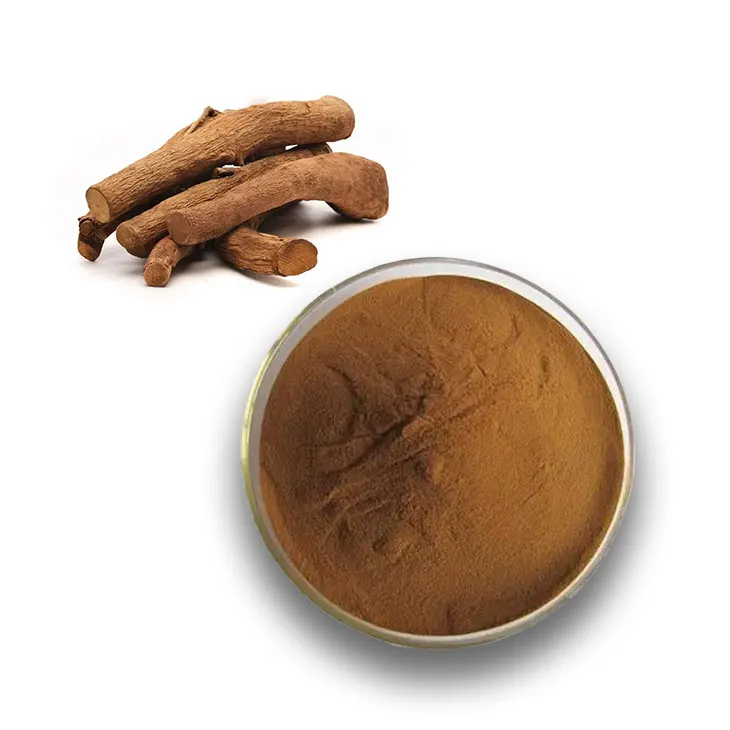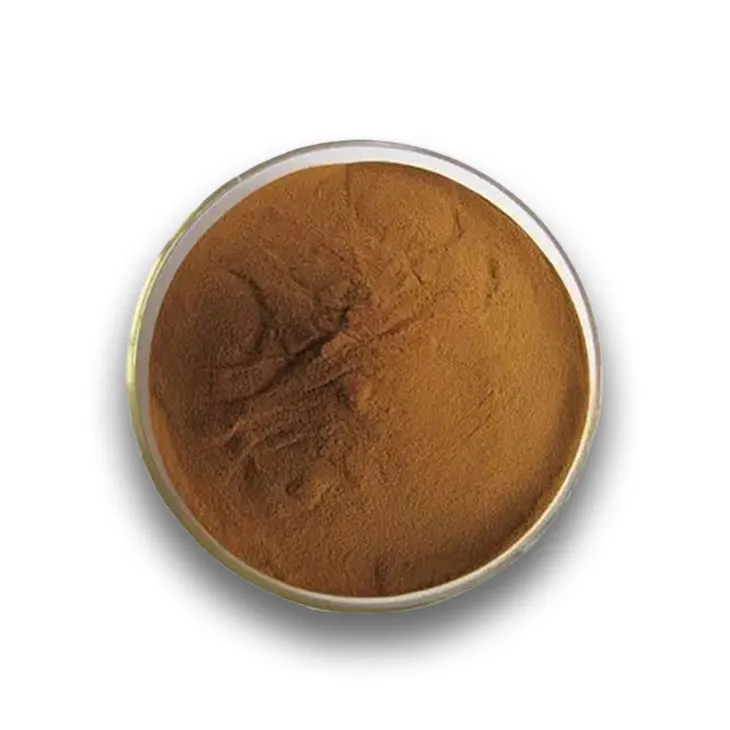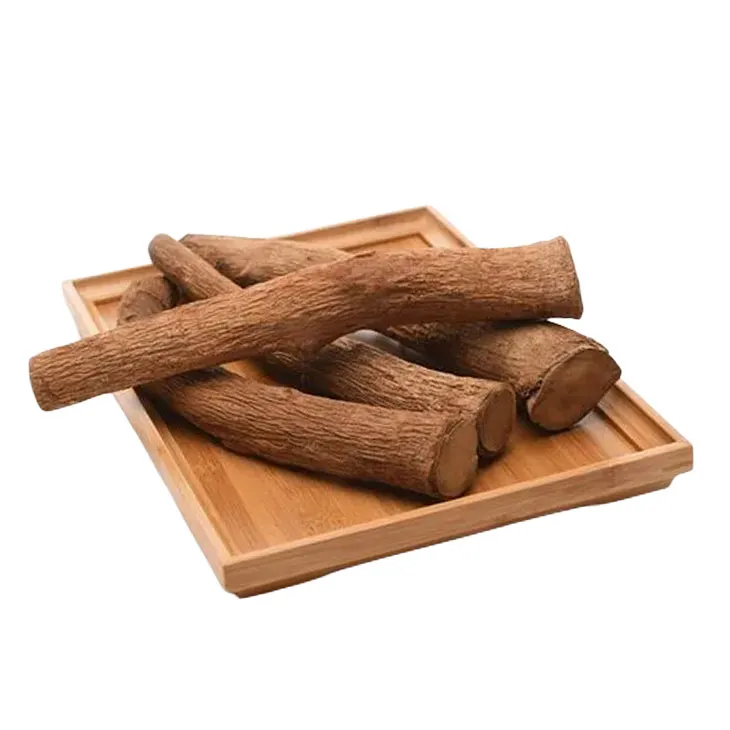- 0086-571-85302990
- sales@greenskybio.com
Components of Tongkat Ali extract in fertilizers and feeds.
2024-11-30

1. Introduction
Tongkat Ali, also known as Eurycoma longifolia, is a plant native to Southeast Asia. The extract of Tongkat Ali has attracted significant attention in the fields of fertilizers and feeds. This is due to its potential to contain various beneficial components. Fertilizers with Tongkat Ali Extract may offer unique advantages for plant growth, while in feeds, it could have positive impacts on animal health and productivity. Understanding the components of Tongkat Ali Extract in these applications is crucial for realizing its full potential in modern agricultural and livestock - raising industries.

2. Components in Fertilizers
2.1 Organic Compounds
Tongkat Ali Extract may contain a variety of organic compounds. These can include polyphenols and flavonoids. Polyphenols are known for their antioxidant properties. In the context of fertilizers, they can help in protecting plants from oxidative stress. Oxidative stress can be caused by factors such as pollution, extreme weather conditions, and certain pests. By reducing oxidative stress, polyphenols can contribute to better plant growth and development.
Flavonoids, on the other hand, can play a role in plant - microbe interactions. They can attract beneficial soil microbes, such as mycorrhizal fungi. Mycorrhizal fungi form a symbiotic relationship with plant roots. They help in nutrient uptake, especially phosphorus. The presence of flavonoids in Tongkat Ali extract in fertilizers can potentially enhance this relationship, leading to improved soil fertility and better nutrient availability for plants.
2.2 Mineral Elements
Tongkat Ali plants are known to accumulate certain mineral elements. When these plants are used to produce extracts for fertilizers, these minerals can be transferred. For example, potassium is an essential mineral for plants. It is involved in processes such as osmoregulation, enzyme activation, and photosynthesis. Tongkat Ali extract may contain potassium in a form that is easily absorbed by plants.
Another important mineral could be magnesium. Magnesium is a central component of the chlorophyll molecule. Chlorophyll is crucial for photosynthesis. If Tongkat Ali extract can supply magnesium to plants, it can enhance their ability to produce food through photosynthesis, leading to better growth and productivity.
2.3 Growth - Promoting Substances
There may be growth - promoting substances present in Tongkat Ali extract. One such potential substance could be auxins - like compounds. Auxins are plant hormones that regulate cell elongation, root development, and apical dominance. If Tongkat Ali extract contains auxin - like substances, it could stimulate plant growth, especially in terms of root development. A well - developed root system is essential for plants to absorb water and nutrients from the soil efficiently.
Also, there might be substances that can enhance the production of other plant hormones, such as cytokinins. Cytokinins are involved in cell division, shoot growth, and delaying senescence. By promoting the production of cytokinins, Tongkat Ali extract could contribute to the overall growth and vitality of plants.

3. Components in Feeds
3.1 Bioactive Compounds for Immune System Boost
Tongkat Ali extract in feeds may contain bioactive compounds that can enhance the immune system of animals. One group of such compounds could be glycosides. Glycosides have been shown to have immunomodulatory effects in animals. They can stimulate the production of immune cells, such as lymphocytes and macrophages. These immune cells play a crucial role in defending the body against pathogens, including bacteria, viruses, and parasites.
Another possible compound is saponins. Saponins have antimicrobial and antiviral properties. When animals consume feeds containing Tongkat Ali extract with saponins, it can help in preventing infections. This is especially important in livestock - raising, where diseases can cause significant economic losses.
3.2 Compounds for Digestion Improvement
There are components in Tongkat Ali extract that can potentially improve digestion in animals. Fiber - like substances may be present. These can help in promoting gut motility. A healthy gut motility is essential for proper digestion and absorption of nutrients. It can prevent problems such as constipation in animals.
Also, there might be substances that can enhance the activity of digestive enzymes. For example, some compounds in the extract could stimulate the production or activity of proteases and lipases. Proteases are involved in the breakdown of proteins, while lipases break down fats. By enhancing the activity of these enzymes, Tongkat Ali extract in feeds can improve the digestion and utilization of dietary proteins and fats in animals.
3.3 Growth - Promoting Components
Tongkat Ali extract may contain growth - promoting components for animals. Amino acids are the building blocks of proteins, and some essential amino acids may be present in the extract. If animals consume feeds with Tongkat Ali extract rich in amino acids, it can support muscle growth and overall body development.
There could also be substances that can enhance the efficiency of nutrient absorption. For instance, some components might improve the absorption of vitamins and minerals from the feed. This can lead to better growth rates and improved productivity in animals.

4. Scientific Perspective
From a scientific perspective, research on Tongkat Ali extract in fertilizers and feeds is still in its early stages. However, some studies have shown promising results. For example, in vitro studies on plant cells have demonstrated the positive effects of Tongkat Ali extract components on cell growth and development. These studies have helped in identifying the potential bioactive compounds present in the extract.
In the case of feeds, animal trials have been conducted. Some of these trials have shown that animals fed with Tongkat Ali - supplemented feeds had improved immune responses. However, more research is needed to fully understand the mechanisms of action of the different components. This includes studies on how these components interact with the animal's body at the molecular level, such as how they bind to receptors and regulate gene expression.
5. Ecological Perspective
Ecologically, the use of Tongkat Ali extract in fertilizers and feeds can have several implications. In fertilizers, the presence of Tongkat Ali extract can promote the growth of plants in a more sustainable way. Since it can enhance soil fertility through promoting beneficial soil microbes, it can reduce the need for synthetic fertilizers. This can have a positive impact on soil health and biodiversity. Synthetic fertilizers can sometimes have negative impacts on soil organisms and water quality.
In feeds, the use of Tongkat Ali extract can lead to healthier animals. Healthier animals are less likely to spread diseases, which can have a positive impact on the overall ecological balance. Also, if animals are more efficient at digesting their food and growing, it can reduce the environmental footprint of livestock - raising. For example, less feed may be required to achieve the same growth rate, which means less land is needed for feed production.
6. Economic Perspective
From an economic perspective, the use of Tongkat Ali extract in fertilizers and feeds can bring several benefits. In the fertilizer industry, products with Tongkat Ali extract can potentially be marketed as "green" and "sustainable" fertilizers. This can attract consumers who are increasingly interested in environmentally friendly products. It can also open up new markets for Tongkat Ali producers, as the demand for such fertilizers may increase.
In the livestock - raising industry, the use of Tongkat Ali - supplemented feeds can lead to improved productivity. Animals may grow faster, have better meat quality, and be less prone to diseases. This can result in higher profits for farmers. Additionally, the use of Tongkat Ali extract in feeds can potentially reduce the cost of veterinary treatments, as animals are healthier.
7. Conclusion
Tongkat Ali extract contains various components that have potential applications in fertilizers and feeds. In fertilizers, it can contribute to soil fertility, nutrient uptake, and plant growth. In feeds, it can boost the immune system, improve digestion, and promote growth in animals. From scientific, ecological, and economic perspectives, the use of Tongkat Ali extract in these industries shows great promise. However, more research is needed to fully understand the components, their mechanisms of action, and to optimize their use. With further development, Tongkat Ali extract could play an important role in modern agricultural and livestock - raising industries, contributing to more sustainable and productive practices.
FAQ:
What are the main components of Tongkat Ali extract in fertilizers?
Tongkat Ali extract in fertilizers may contain components such as organic acids and certain minerals. Organic acids can help to break down soil nutrients into more accessible forms for plants, and minerals can directly contribute to soil fertility improvement. However, the specific composition can vary depending on the extraction method and the quality of the raw Tongkat Ali material.
How do the components of Tongkat Ali extract in feeds enhance animal growth?
The components in Tongkat Ali extract for feeds may work in multiple ways to enhance animal growth. Some bioactive compounds in the extract can stimulate the production of growth - related hormones in animals. Additionally, by improving digestion, animals can better absorb nutrients from their feed, which is essential for growth. These components also might have antioxidant properties that help maintain the overall health of animals, reducing the energy diverted for fighting diseases and thus promoting growth.
Are there any ecological benefits of using Tongkat Ali extract in fertilizers?
Yes, there are ecological benefits. When Tongkat Ali extract is used in fertilizers, it can potentially improve soil structure. A better - structured soil allows for better water infiltration and retention, which is beneficial for the overall ecosystem. It can also enhance the activity of beneficial soil microorganisms, which play a crucial role in nutrient cycling and maintaining soil health. Moreover, if it reduces the need for chemical fertilizers, it can decrease the risk of chemical runoff and pollution.
What scientific research methods are used to analyze the components of Tongkat Ali extract in feeds?
Various scientific research methods are used. One common method is chromatography, which can separate and identify different components in the extract. Spectroscopy techniques are also used to analyze the chemical structure of the components. In vivo and in vitro experiments are carried out on animals to study the effects of the extract components on digestion, immune function, and growth. Additionally, genomic and proteomic studies may be employed to understand how the components interact with the biological systems of animals at the molecular level.
How does the economic aspect influence the use of Tongkat Ali extract in fertilizers and feeds?
Economically, the cost of extracting and processing Tongkat Ali extract plays a role. If the cost is too high, it may limit its widespread use in fertilizers and feeds. However, if the extract can significantly improve crop yields in the case of fertilizers or animal productivity in the case of feeds, it can lead to increased economic returns for farmers and livestock producers. The market demand for products grown or raised with Tongkat Ali - enhanced fertilizers or feeds also affects its economic viability. If consumers are willing to pay a premium for products with potential health or quality benefits associated with Tongkat Ali use, it can drive the adoption of Tongkat Ali extract in these industries.
Related literature
- Analysis of Bioactive Components in Tongkat Ali Extract for Agricultural Applications"
- "The Role of Tongkat Ali Extract in Improving Feed Efficiency in Livestock"
- "Tongkat Ali and Soil Fertility: A Comprehensive Review"
- ▶ Hesperidin
- ▶ Citrus Bioflavonoids
- ▶ Plant Extract
- ▶ lycopene
- ▶ Diosmin
- ▶ Grape seed extract
- ▶ Sea buckthorn Juice Powder
- ▶ Fruit Juice Powder
- ▶ Hops Extract
- ▶ Artichoke Extract
- ▶ Mushroom extract
- ▶ Astaxanthin
- ▶ Green Tea Extract
- ▶ Curcumin
- ▶ Horse Chestnut Extract
- ▶ Other Product
- ▶ Boswellia Serrata Extract
- ▶ Resveratrol
- ▶ Marigold Extract
- ▶ Grape Leaf Extract
- ▶ New Product
- ▶ Aminolevulinic acid
- ▶ Cranberry Extract
- ▶ Red Yeast Rice
- ▶ Red Wine Extract
-
White Willow Bark Extract
2024-11-30
-
Sophora Japonica Flower Extract
2024-11-30
-
Tongkat Ali Extract Powder
2024-11-30
-
Polygonum Cuspidatum Extract
2024-11-30
-
Baicalin
2024-11-30
-
Elderberry Extract
2024-11-30
-
Aguaje Extract
2024-11-30
-
Ivy Extract
2024-11-30
-
Konjac Powder
2024-11-30
-
Troxerutin
2024-11-30





















